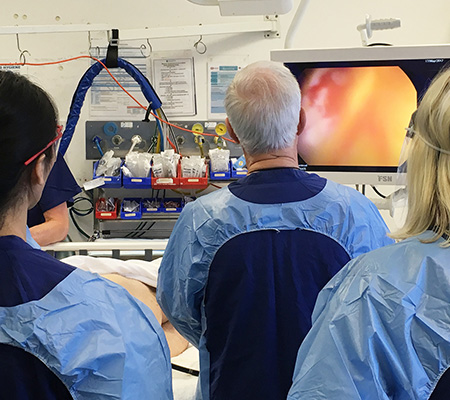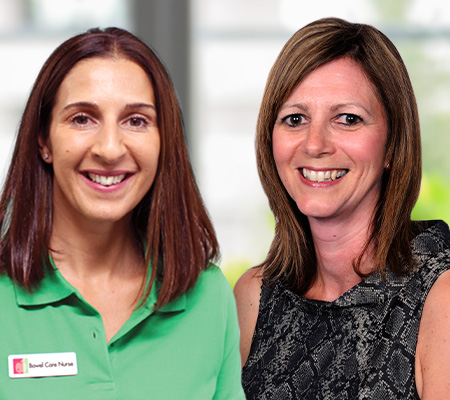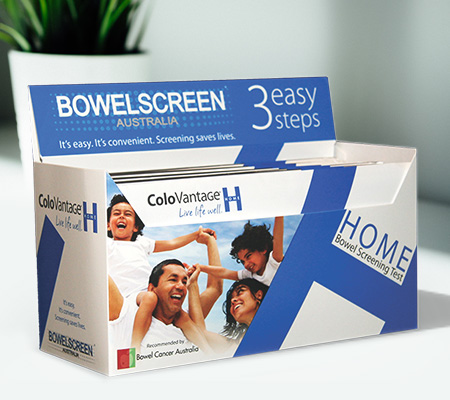

You can help us amplify the patient’s voice by sharing the My Colonoscopy Experience questionnaire with anyone you know who has received a colonoscopy in Australia.


- clear information about what to expect at each stage;
- provision of guidance regarding the post-procedure process; and
- feelings of trust and confidence in staff.
- the referral process should be more proactive and timelier;
- more choice should be made available in terms of bowel prep; and
- all relevant information in the colonoscopy report should be reviewed with the patient.
Talk to your GP or pharmacist today about BowelScreen Australia.
Order a screening test online or by calling 1800 555 494.
| How to screen

STEP 1
- Take the instructions, your information sheet, with the barcode labels, brush kit and test card into the bathroom.
- Flush toilet BEFORE your bowel movement.
STEP 2
- After your bowel movement, DO NOT PLACE USED TOILET PAPER IN THE TOILET BOWL. Instead, put the used toilet paper in one of the blue waste bags from the brush kit envelope.
- DO NOT FLUSH the toilet.
STEP 3
- Lift the flap marked 'LIFT HERE FOR SAMPLE 1' on the test card to uncover the small white square marked 'SAMPLE 1'.

- Using one of the blue brushes, gently brush the surface of the poo for about five seconds.
- If the poo is loose, simply stir the water around the poo.
- Remove the brush from the water and gently shake it once to remove excess water and any clumps of poo.
STEP 5
- Transfer the water sample by gently dabbing the bristles of the brush onto the small white square on the test card for about five seconds (some staining of the square may occur).
- Put the used brush in the blue waste bag and put the bag in your rubbish bin.
STEP 6
- Close the flap back over 'SAMPLE 1' and stick the flap down using one of the barcode labels located on the information sheet.
- See diagrams above for the correct way to position the label.
SAMPLE 2 - Your second poo
This sample must be from a different poo to increase the chance of detecting non-visible blood.

STEP 7
- Use the second blue brush, blue waste bag and the test card flap marked 'SAMPLE 2', and repeat steps 1 to 5 above.
- Use the second barcode label to reseal flap marked 'SAMPLE 2'.
- Complete the information sheet.
- You must complete your GP's details or the test cannot be processed.
- Place the test card and information sheet in the reply paid envelope.
- Mail the envelope so it is received by the laboratory for analysis within 14 days of the date you collected SAMPLE 1.
- Your results will be mailed to you and your nominated GP.

| Become a stockist
Community pharmacies or General Practices interested in stocking
BowelScreen Australia ColoVantage test kits, please call Clinical Genomics on 1800 55 65 75
during business hours and select Option 3 when prompted.
Talk to your pharmacist today about BowelScreen Aotearoa.
Find your nearest Life or Unichem pharmacy or order a screening test online.
Please note: The New Zealand Government is phasing in a National Bowel Screening Program to be completed by 2021. New Zealander’s aged 60 to 74 years who are eligible to for publicly funded health care will receive an invitation to participate in the screening program when it becomes available in their DHB.


STEP 1
- Take the instructions, your information sheet, with the barcode labels, brush kit and test card into the bathroom.
- Flush toilet BEFORE your bowel movement.
STEP 2
- After your bowel movement, DO NOT PLACE USED TOILET PAPER IN THE TOILET BOWL. Instead, put the used toilet paper in one of the blue waste bags from the brush kit envelope.
- DO NOT FLUSH the toilet.
- Lift the flap marked 'LIFT HERE FOR SAMPLE 1' on the test card to uncover the small white square marked 'SAMPLE 1'.

- Using one of the blue brushes, gently brush the surface of the poo for about five seconds.
- If the poo is loose, simply stir the water around the poo.
- Remove the brush from the water and gently shake it once to remove excess water and any clumps of poo.
- Transfer the water sample by gently dabbing the bristles of the brush onto the small white square on the test card for about five seconds (some staining of the square may occur).
- Put the used brush in the blue waste bag and put the bag in your rubbish bin.
STEP 6
- Close the flap back over 'SAMPLE 1' and stick the flap down using one of the barcode labels located on the information sheet.
- See diagrams above for the correct way to position the label.

- Use the second blue brush, blue waste bag and the test card flap marked 'SAMPLE 2', and repeat steps 1 to 5 above.
- Use the second barcode label to reseal flap marked 'SAMPLE 2'.
- Complete the information sheet.
- You must complete your GP's details or the test cannot be processed.
- Place the test card and information sheet in the reply paid envelope.
- Mail the envelope so it is received by the laboratory for analysis within 14 days of the date you collected SAMPLE 1.
- Your results will be mailed to you and your nominated GP.

{grebox}
- A colonoscopy within 30 days from first healthcare presentation for people experiencing symptoms suggestive of bowel cancer or a positive screen. If wait-times exceed 120 days, a prognosis can worsen if cancer is present.
- Transparency and public reporting of colonoscopy wait-times by all public and private healthcare facilities, released quarterly;
- Adequate funding for colonoscopy services across Australia;
- Collection of patient-reported experience measures within 30 days via a questionnaire from all people who undergo a colonoscopy, asking them about their pre-procedure experience (whether people understood the risks/benefits), the hospital experience (the procedure itself, issues of dignity/privacy); and post-procedure complications (bleeding/pain), with results publicly reported;
- Minimum quality standards and key performance indicators (KPIs) for the delivery of colonoscopy within Australia, along with recording and public reporting of performance against the standards and KPIs.{/grebox}









Tasmania
In February 2023, the Tasmanian Premier announced $38 million in funding to deliver an additional 22,000 endoscopies over the next four years with the aim of driving down waiting lists to a sustainable level of 2,500 people at any one time by June 2027.
In August 2021, the Tasmanian Budget delivered additional funding for elective surgery. As part of a $40 million top up, funding for an additional 7,000 elective surgeries was promised, on top of funding committed to at the State Election for an extra 22,300 surgeries and endoscopies.
On 9 April 2019, the Opposition Leader Bill Shorten promised to invest $500 million to reduce waiting times for cancer treatment and surgery in public hospitals across Australia if elected. Mr Shorten cited official data, stating 83 per cent of people who received a positive-test result from the government's bowel cancer screening program did not have a follow-up colonoscopy within the recommended time.
- Eradicate, within 12 months of the election (17 March 2018), the overdue waiting list for colonoscopy after a positive bowel cancer screening test result;
- Regularly publish the number and waiting times of people requiring a colonoscopy after a positive bowel cancer screening test result;
- Pursue the national time target for a colonoscopy after a positive bowel cancer screening test result.
According to the Premier's media release, 'the Government's $5 million commitment towards additional colonoscopies will see SA Health work with the private sector to carry out an extra 2,700 colonoscopies over the next nine months, the remaining overdue colonoscopies will be funded with Elective Surgery Funds. This is in addition to the approximately 25,000 colonoscopies carried out in the SA public health system each year'.









